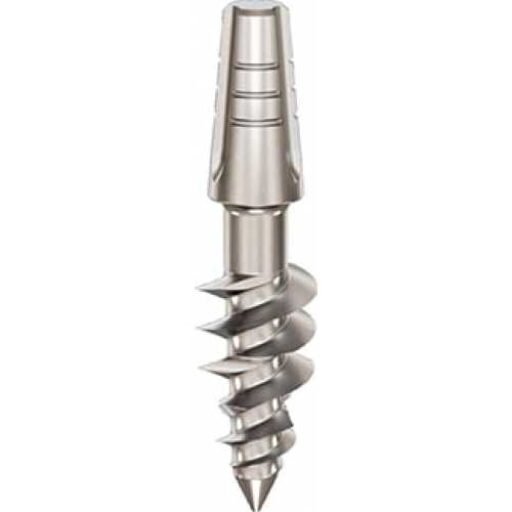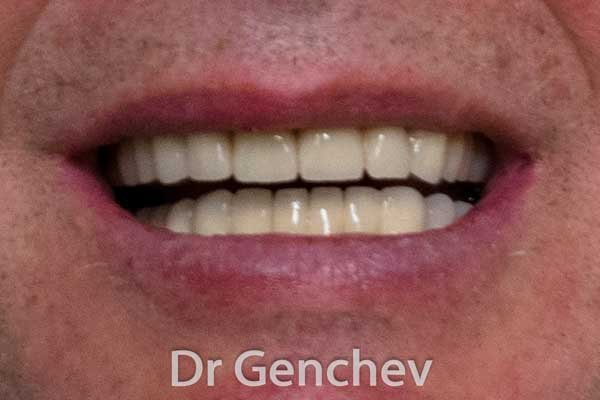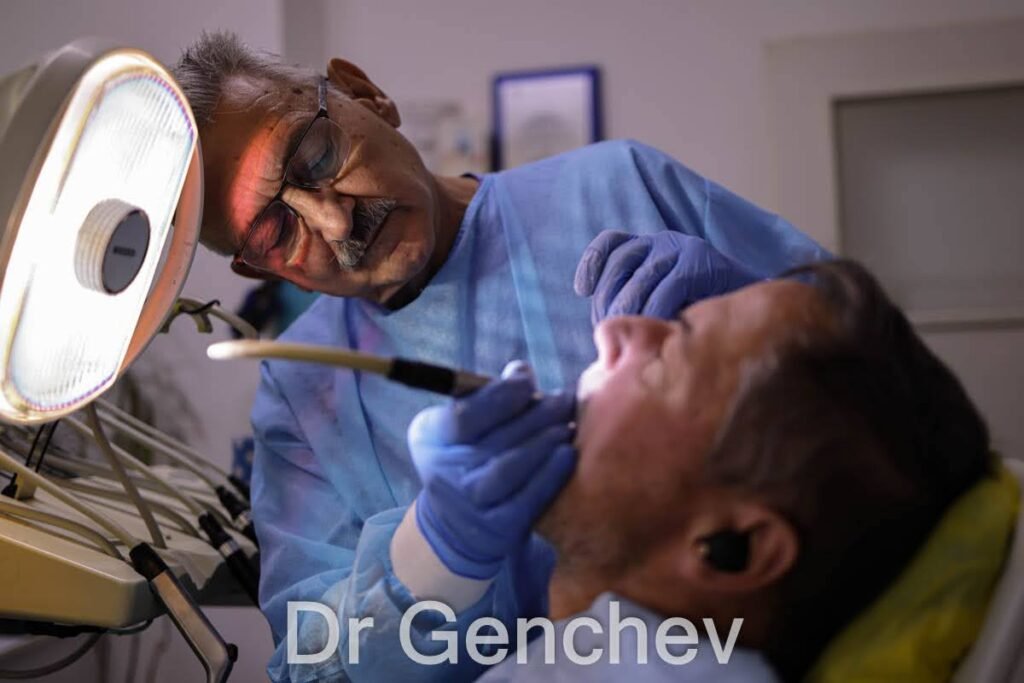How the basal implant treats the effects of bruxism
Basal implants treat the symptoms of bruxism: tooth wear, tooth loss and occlusal collapse.
Basal implants are placed in cortical bone, which is hard bone. It is more resistant to the friction of teeth grinding caused by bruxism. As a result they are the best solution for the full dental restoration of patients that suffer the effects of excessive teeth grinding.
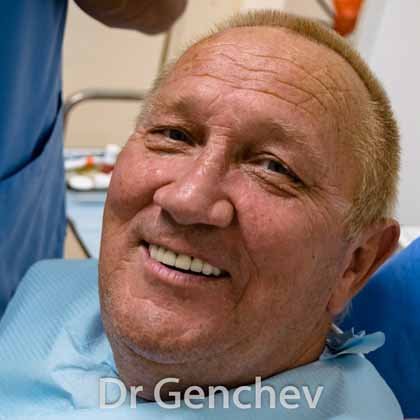
What is bruxism?
What is teeth grinding?
Bruxism is the grinding of teeth. The pressure of excessive teeth grinding is very powerful and damages the teeth. Tooth enamel wears away to the point where the nerves in the teeth are exposed. The teeth become sensitive to hot and cold. The teeth wear down and break before falling out. Over time, eventually most of the teeth fall out and the jaws collapse.

Treatment of bruxism with a basal dental implant
How can the effects of teeth grinding be resolved with basal implants?
Basal dental implants are the best solution for bruxism because they are longer and fixed in the cortical bone, which is deeper and harder. This gives strength and stability to the fixed bridge that welds all the implants and teeth together.
For patients who suffer from the effects of bruxism implantologists specializing in basal implantology generally extract all teeth that are not stable. Some stable teeth, such as canines, can be retained and used with implants to support the dental bridge.
Tooth wear
How do you solve wear of teeth caused by the grinding?
Basal implants are more resistant to teeth grinding because they are longer and placed in the cortical bone, which is hard and deep. The implants and teeth are covered by a full dental bridge made from a single block that prevents any movement of the implants and teeth and protects them from the grinding.
PFM metal-ceramic crowns are more resistant to the wear of teeth grinding because they are a hard material. Composite, for example, is too soft. And zirconium can chip or crack. And if the enamel of a metal-ceramic crown is damaged by teeth grinding, it can be repaired in the mouth without removing the prosthesis.
Dentists usually make you a dental splint to wear at night. It protects the crowns and lets you sleep better.
Tooth loss
How do I replace missing teeth?
If teeth have already fallen out, it’s important to replace them with dental implants. In basal implantology, missing teeth are replaced with basal dental implants positioned along the entire length of the jaw, including behind the sinuses. Pterygoid implants recreate the natural functionality of the mouth and allow the patient to chew normally on the molar teeth.
Occlusal collapse
How do basal dental implants compensate for loss of jaw height?
The loss of teeth especially at the back of the jaw leads to a collapse in the level of the jaws, technically called an occlusal collapse. Dentists can rectify the occlusal collapse and restore a natural level with basal dental implants. Pterygoid implants behind the sinuses and full bridges can raise the jaws to a level that is comfortable for the patient.
Before and after basal implants for bruxism
Dental restoration for bruxism with basal dental implants and fixed bridges. The teeth are worn out from the excessive grinding.
The benefits of basal dental implants
What are the advantages of basal implants for treating the effects of bruxism?
Basal dental implants have the benefit of being longer and fixed deeper into the cortical bone that is hard. It is the best option to resist the friction resulting from the excessive grinding of teeth.
Disadvantages of conventional dental implants
What are the limitations of traditional dental implants for bruxism?
Traditional dental implants are short and placed in the cancellous bone of the gums that resorbs with the loss of teeth. In patients with bruxism, this spongy gum bone is not a reliable type of bone for the placement of dental implants.
Implant dentists who practice conventional implantology with conventional dental implants often refuse to treat patients with bruxism because conventional implant-supported bridges are not resistant to teeth grinding.
Traditional dental implants are not a good solution for bruxism. They cannot withstand the pressure of teeth grinding. Bridges on conventional implants move and eventually fall.
The limits of the All on 4 system
What are the problems of using the All on 4 system to treat bruxism?
The All on 4 and All on 6 dental restoration system is not a good solution for patients with bruxism. Bridges are placed on conventional implants, which are short. And these implants are set in thin spongy soft bone, mainly in the front of the jaws. It is difficult to resist tooth grinding.
Comparison of basal and conventional dental implants for bruxism
Basal implant

long implant

cortical bone

no resorption
Classic implant

short implant

cancellous bone

bone resorption
Alternatives to dental implants
What are the alternatives to dental implants for treating periodontal disease?
It is difficult to replace missing or loosening teeth without using basal implants. The only alternative is total extraction of the teeth and fitting removable prostheses that are fixed with glue.

Dr Genchev
Basal Implant Dentist
Dr Georgy Genchev is one of the best specialists for Full Mouth Dental Implants. He specialises in patients with severe bone loss.
He has over 12 years experience in full dental rehabilitation with basal dental implants.
Ask for a free online dental consultation

1 visit 5 days

2 jaws €8990

Bulgaria
Request a Call Back
Fast Response
For a fast response please call Dr Genchev for free directly via WhatsApp or send him an email.
Examples of treatment for bruxism
with basal dental implants
Basal Dental Implant for bruxism
This patient from Switzerland grinded its teeth to the point of abrasion. The teeth were very sensitive. Dr Genchev completed full mouth dental restoration with basal dental implants in 1 visit of 5 days.
Basal dental implants for smokers
Basal dental implants are the only long-term solution for smokers. Basal implants are unaffected by the heat of the cigarette smoke.

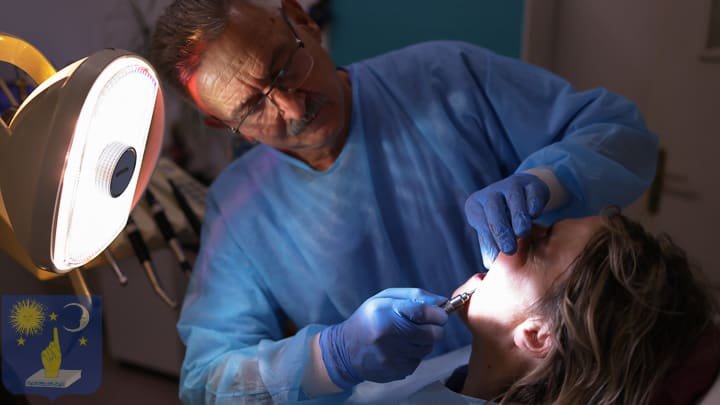
Basal dental implants for diabetes
Basal dental implants are recommended for patients with diabetes because they are well integrated into the cortical bone.
